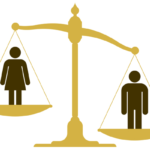A group of civil society organisations has explained why it went to court to seek justice for about 72 women whom, it said, were illegally arrested and detained by some government agencies.
Deji Ajare, the executive director of Sterling Law Centre, who led a coalition of 58 civil society organisations, had filed the action against Abuja Environmental Protection Board (AEPB), police and other law enforcement agencies over the April 2019 arrests.
- PODCAST: Should citizens take up arms to protect themselves?
- Disquiet over killing of ex-LASU student
Speaking with Daily Trust recently, Ajare said the purpose of the suit was to challenge the powers of my government agency to “violate the rights of women with impunity”.
Only six of the detained women signed to bring the action to enforce their fundamental human rights to personal liberty and freedom of movement, right to personal dignity, freedom from torture, freedom of association and freedom from discrimination.
On April 26, 2019, it was gathered, over 100 staff of the agencies invaded clubs, hotels, supermarkets and other business places in Abuja to arrest women under the guise of arresting sex workers.
The raids were said to have been authorised by the Social Development Secretariat of the FCT.
It was also learnt that in the process of the arrests, the women were beaten, and barred from accessing legal representation in violation of their rights as guaranteed in the constitution.
After two years of trial, Justice Evelyn Maha of the Federal High Court, in her judgment on August 5, 2021, held that the actions of the AEPB, the Nigerian Security and Civil Defence Corps (NSCDC), and the Inspector General of Police violated the fundamental rights of the defendants.
The court further issued an injunction restraining the police, NSCDC and other listed respondents from arresting women in such circumstances and in a manner that discriminates on the basis of gender.
One of the applicants was awarded N4m, two others N3m each, and three others N2m each.

 Join Daily Trust WhatsApp Community For Quick Access To News and Happenings Around You.
Join Daily Trust WhatsApp Community For Quick Access To News and Happenings Around You.

